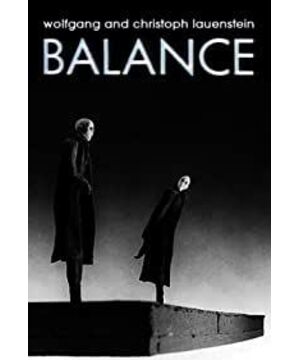At the beginning, 5 people stood on a suspended board, and they stood on the five endpoints, and the board was balanced. After a while, someone fished a box from under the board, and the weight on his side increased, so the other four walked to the other end of the board to balance with him. (Everyone wants that box, according to the writer of the story.) At this point one of the four takes a step back, the balance is broken, and the box slides toward him.•••The animation arrives It's far from over here, but I've touched on one of the most important moments for this article - let's take a guess, what will the other three do? If they stand still and their weight has increased on their side, they will slide down together; if they don't want to slide down, they have only one option - walk across from the person who now has the box, which is another balance. That way they can keep themselves safe, even though it takes them farther from the box.
Next, the five people in the cartoon started the game to capture the box. The process can't be talked about all the time. The people who made the film were very smart and came up with a lot of ways to get the box, so I don't need to go into details here. I think there are at least a few presets in this cartoon, and they will also become the presets of this small article: 1. People want to get benefits 2. People are unwilling to "harm others and themselves" 3. We are all in "a boat" ” (that is, in the same balancing mechanism). (Of course, there may still be "Lei Feng" in this society, but that's not the majority.) At
the end of the cartoon, those five people moved their hands for the box, four of them were pushed down, and only one person was left with the box in the end. The two ends of the tablet are far away from each other, which means that the cartoon still considers people's irrational behavior, so I don't take "people are rational" as a presupposition, but I still think that although individuals may be irrational at any time However, the whole society is still rational, and most people in the society are also rational, or to be more precise, they are instrumental in “seeking advantages and avoiding disadvantages”. As for whether value rationality is common, I dare not say.
When the other three people walk to the other end of the board, it is a "moral" behavior, because the situation at that time is actually very dangerous. The first person to step back is making a dangerous move. It was on the verge of collapse, and the behavior of the other three people was to protect the balance of the system when they were young, and to help others get the box when they were young. Of course, this is their self-protection behavior at the same time. The morality I want to speak of is such a "morality of maintenance". The purpose of a utilitarian is to obtain benefits, he wants to reach out to the benefits, and the benefits are limited (that's why people have to fight), so there must be games between people. What kind of person is strong? My definition is: the person who analyzes the game situation in the fastest time and takes action immediately, preferably can also create a new game strategy (because if it is always a strategy, the whole game will be lost before the new conditions arise. Stuck in an infinite loop - the "box" is always sliding between endpoints), in short - the "smart" and "brave" people. We can think that the person who retreats has already thought clearly: as long as he retreats, others must walk across from him, and this behavior kills two birds with one stone: both he gets the box and drives others farther away from the box. . Who is the weak? - People who can't make decisions right away. Here we do not rule out the possibility that they may not have figured out the situation. People with relatively low IQs are always weak. Therefore, the "maintenance morality" that I want to propose is something that the weak must do. This is an "objectively necessary" moral behavior, and he has to be expelled by this game disadvantage to maintain the balance of the system. , they take the initiative to be "moral" people must also be "moral" people, "morality" is their obligation. A weak person may wake up and become a strong person after suffering a loss, but as a group of "weak", no matter how the specific weak members change, their game predicament will not change, as long as they still dare not make a decision.
The reader will think that there should be a closer perspective to the discussion, and it seems that I should now give some real-world examples. Of course, society is much more complicated than cartoons. I admit that I haven't found a relatively standard example. Those who were "the first to eat crabs" during the reform and opening up seemed to be the "strong", but the "weak" didn't seem to be given to others. The reality of the benefits is how much the response, anyway, most of the people next to them are not getting any benefits. So I think the balance mechanism of society may be buried deeper than what is reflected in the cartoon. However, one manifestation of such a deep mechanism may be that some people always say that morality is a social norm, and everyone's compliance with social norms is conducive to social harmony. I'm not calling on everyone to make a revolution. I don't think it's a social injustice. On the contrary, I want to say that morality is the guarantee of social harmony. It's good, but it doesn't have any moral appeal. It's just the rationality of the weak. Just masturbating.
Morality is self-discipline - is this a rotten principle? I don't think so. The reason why the weak do not make a decision is that in addition to some people's low IQ, there must be some people who are aware of the fact that the strong are aware, but he may still not be sure if he retreats will lead to the collapse of the system, the reason should be him. If you are afraid that others are going to "harm others and yourself", what should you do? Only choose not to act. This found another interesting thing: the weak seem to regard others as immoral, while the strong are conducting game analysis rationally. Therefore, the so-called "self-discipline" exists, not because of one's own moral sense, but because of a lower evaluation of human nature.
Another more troublesome question for the weak is: once the strong has gained benefits, is it possible to get the benefits back from the strong, while I am still weak? Do I have any other choice besides becoming a strong man? Because I don't want to continue the cycle of losing the game between the weak and the strong, I want a way to end this once and for all by turning all the strong into the weak, or rather, turning everyone into the same person. game. From slave uprisings to communist movements are attempts to end the game, but it seems that the strong still emerge and the weak continue to "willingly" get into moral dilemmas. Or until the interests are enough to meet everyone's needs, we really can't expect the generalization of the weak, but if the strong always exist before that, why should he distribute the interests to meet everyone's needs? Since the society is still in balance. And if the society is unbalanced, turmoil has occurred, and the strong will appear again, the dream of the weak will still not be realized. Peasant insurgents became emperors, revolutionary fighters became bureaucrats. After the strong become strong, they may create conditions that are more favorable to themselves, enabling them to make decisions faster and more accurately than before. Exploitation is evil, but the ad says "the wool comes from the sheep", so maybe we should understand a little bit about "exploitation". But why don't the weak get those benefits that are not exploited, but provided by society? And in order to continue to live in peace, the weak also admit that these interests should belong to others. Because in addition to exploitation, there is also a "cooperation" between the weak and the strong through rational tacit understanding. This rationality is the result of the operation of society's great rationality.
View more about Balance reviews






